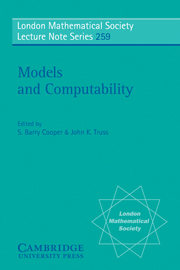Book contents
- Frontmatter
- Contents
- Preface
- Continuous Functionals of Dependent and Transfinite Types
- Degree-Theoretic Aspects of Computably Enumerable Reals
- Simplicity and Independence for Pseudo-Algebraically Closed Fields
- Clockwork or Turing U/universe? - Remarks on Causal Determinism and Computability
- A Techniques Oriented Survey of Bounded Queries
- Relative Categoricity in Abelian Groups
- Computability and Complexity Revisited
- Effective Model Theory: The Number of Models and Their Complexity
- A Survey on Canonical Bases in Simple Theories
- True Approximations and Models of Arithmetic
- On the Topological Stability Conjecture
- A Mahlo-Universe of Effective Domains with Totality
- Logic and Decision Making
- The Sheaf of Locally Definable Scalars over a Ring
- Human Styles of Quantificational Reasoning
- Recursion Theoretic Memories 1954–1978
- Fields Definable in Simple Groups
- A Combinatory Algebra for Sequential Functionals of Finite Type
- Model Theory of Analytic and Smooth Functions
A Survey on Canonical Bases in Simple Theories
Published online by Cambridge University Press: 17 May 2010
- Frontmatter
- Contents
- Preface
- Continuous Functionals of Dependent and Transfinite Types
- Degree-Theoretic Aspects of Computably Enumerable Reals
- Simplicity and Independence for Pseudo-Algebraically Closed Fields
- Clockwork or Turing U/universe? - Remarks on Causal Determinism and Computability
- A Techniques Oriented Survey of Bounded Queries
- Relative Categoricity in Abelian Groups
- Computability and Complexity Revisited
- Effective Model Theory: The Number of Models and Their Complexity
- A Survey on Canonical Bases in Simple Theories
- True Approximations and Models of Arithmetic
- On the Topological Stability Conjecture
- A Mahlo-Universe of Effective Domains with Totality
- Logic and Decision Making
- The Sheaf of Locally Definable Scalars over a Ring
- Human Styles of Quantificational Reasoning
- Recursion Theoretic Memories 1954–1978
- Fields Definable in Simple Groups
- A Combinatory Algebra for Sequential Functionals of Finite Type
- Model Theory of Analytic and Smooth Functions
Summary
Introduction
The class of simple first order theories has recently been intensively studied. Simple theories were introduced by Shelah, who attempted to find a strictly broader class than the class of stable theories, in which forking is still reasonably well-behaved. After some years of neglect, the present author proved, in his doctoral thesis, that forking satisfies almost all the basic properties which hold in stable theories. In fact, a large amount of the machinery of stability theory, invented by Shelah, is valid in the broader class of simple theories. All stable theories are simple, but there are also simple unstable theories, such as the theory of the random graph. Many of the theories of particular algebraic structures which have been studied recently (pseudofinite fields, algebraically closed fields with a generic automorphism, smoothly approximable structures turn out to be simple unstable, too.
Since a general survey of simple theories written by the author and A. Pillay appeared in the Bulletin of Symbolic Logic, here we shall focus on the notion of canonical base and Zilber's theorem in the context of simple theories. Roughly speaking, Zilber's theorem (Theorem 4.4) on a strongly minimal set says that any nontrivial ω-categorical, strongly minimal set is essentially a vector space over a finite field. Zilber used the notion of canonical base (for stable theories) significantly in the proof of this theorem.
- Type
- Chapter
- Information
- Models and Computability , pp. 241 - 254Publisher: Cambridge University PressPrint publication year: 1999



